Afghanistan War, CIA Sponsored Terror, Civil Liberties, Crony Capitalism, Human Rights, Iraq War, Political Prisoner, Prison Industry, Torture, Truth to Power, War Resister
Podcast: Play in new window | Download
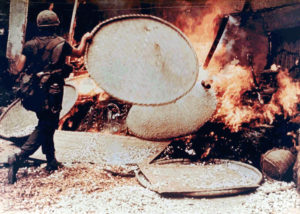
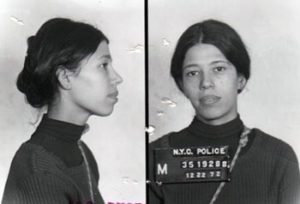
My Lai Memorial Exhibit
The aggressiveness of United States war machine has killed 500,000 people since 911, caused millions of people to be displaced, and all this at a cost of some $6 trillion.
President Trump has said that “all options are on the table” regarding sending troops to Venezuela. His National Security Adviser John Bolton said that Venezuela, Cuba and Nicaragua are part of the “troika of tyranny ” – in the US’s gun sites. After first promising to withdraw troops from Syria, Trump has reversed himself. Troops are still fighting in Afghanistan after 19 years. Iran remains the ultimate target in the Middle East. How did our country get to the state? What was done 50 years ago in the Vietnam era by millions of American citizens which help end in 1975 the American war in that country?
March 18 marks the 51st anniversary of the infamous My Lai Massacre in Vietnam. Their American troops murdered 504 Vietnamese women, old men, children and babies. It marked a turning point in the American peoples’ revulsion and consequent mobilization against the war.
Guest – former Navy Lieutenant Susan Schnall of Veterans for Peace. She became famous in 1968 when she dropped antiwar leaflets from an airplane on navy ships in San Francisco Bay.
Guest – Mac MacDevitt – is an associate member of Chicago Veterans for Peace and Committee Chair of the My Lai Memorial Project. He is an artist, storyteller and educator who came of age and was forever changed during the Vietnam War. He was radicalized by witnessing the wounded fellow protesters, beaten by US Marshals as night fell after the March on the Pentagon in 1967. In 1981 Mac did a social work internship at the VA Hospital in White River Junction, Vermont in the psych department where he experienced vets dealing with ghosts from Vietnam and earlier wars.
—-
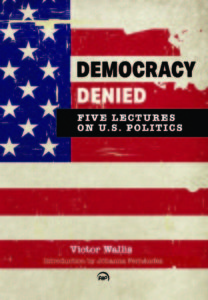
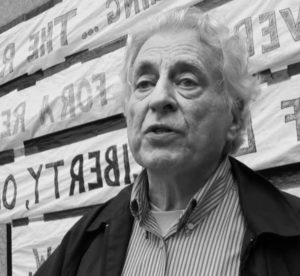
Democracy Denied: Five Lectures on U.S. Politics
The United States is unique among advanced countries in having the greatest inequality, highest poverty rate, highest portion of its population imprisoned, and highest proportion lacking healthcare.
Victor Wallis’ new book Democracy Denied offers a succinct history of several traits unique to the nation.
It came out of a lecture series in China and presents a historically grounded perspective on these traits, including chapters on “American exceptionalism,” on U.S. imperialism, the trajectory of African-descended people in the United States, efforts to develop a socialist alternative to the dominant institutions, and the current configuration of U.S. politics.
Guest – Victor Wallis is a professor in the Liberal Arts department at the Berklee College of Music in Boston. For twenty years he was the managing editor of Socialism and Democracy. He is the author of Red-Green Revolution: The Politics and Technology of Ecosocialism (2018) and of many articles on topics related to environmentalism, social justice, and radical politics. Victor’s activism dates from the 1960s and encompasses issues ranging from U.S. foreign intervention to prisoners’ rights.
———————–

———————–
CIA Sponsored Terror, Civil Liberties, Criminalizing Dissent, Human Rights, Political Prisoner, Prison Industry, Supreme Court, Surveillance, Targeting Muslims, Torture, Truth to Power, War Resister
Podcast: Play in new window | Download

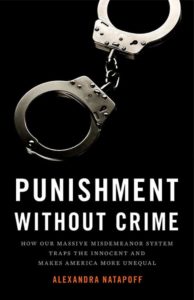
Punishment Without Crime: How Our Massive Misdemeanor System Traps the Innocent and Makes America More Unequal
In the overburdened U.S. criminal justice system, with its burgeoning prison population, we hear a lot about felony convictions. Felonies are crimes usually punishable by a term of more than one year, or the death penalty. What we don’t hear much about are misdemeanors, low level offenses punishable by fines or short terms of imprisonment in local jails.
With ten million petty cases filed annually, most U.S. convictions are misdemeanors. Unlike felonies, however, their processing is typically informal and deregulated. Much like fast-food justice, they have high-volume arrests, weak prosecutorial screening, an overtaxed defense bar, and high plea rates. There is often little meaningful scrutiny to see if convictions are supported by evidence. Innocent people who can’t afford bail often plead guilty just to get out of jail.
What the result of misdemeanor convictions? It’s pretty serious: stigma of a criminal record, misdemeanants are often heavily fined, incarcerated, and/or lose jobs, housing, and educational opportunities. Petty convictions are more frequent and burdensome even as we devote fewer institutional resources to ensuring their validity.
The misdemeanor phenomenon has profound systemic implications. It invites skepticism about whether thousands of individual misdemeanants are actually guilty. It reveals an important structural feature of the criminal system: that due process and rule-of-law wane at the bottom of the penal pyramid where offenses are pettiest and defendants are poorest. Misdemeanor processing is the way poor defendants of color are swept up into the criminal system with little or no regard for actual guilt.
In her new book, Punishment Without Crime: How Our Massive Misdemeanor System Traps the Innocent and Makes America More Unequal, Law Professor Alexandra Natapoff takes an in-depth look at the misdemeanor process is an institutional gateway that explains many of the criminal system’s dynamics and dysfunctions.
Guest – Alexandra Napatoff, University of California Irvine law professor and a member of the American Law Institute. She’s also a former federal public defender, a community organizer, and the recipient of an Open Society Institute Community Fellowship.
—-
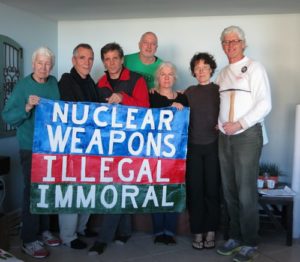
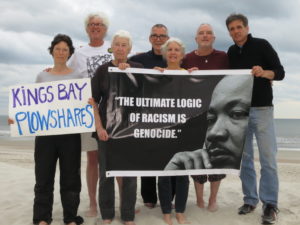
Kings Bay Plowshares 7
In our society nuclear weapons that can destroy all creation are taken as a normal, even an inevitable, part of life. In a dramatic action to break what they call “the crime of silence“ seven Catholic peace activists entered the Kings Bay trident submarine base in Georgia last April to perform an act of symbolic disarmament.
They used hammers to follow the prophecy of Isaiah “to beat swords into plowshares” and poured blood to make holy what was evil in a sacramental action.
Kings Bay is homeport to six ballistic missile trident submarines, each of which deploy 16 trident missile’s carrying four or more warheads of at least 100 kilotons. The Hiroshima bomb was 14 kilotons. Each submarine thus has the distructive power of at least 500 Hiroshima bombs.
The plowshares seven face up to 25 years in federal prison. Their trial is coming up in the next month. Theirs was the latest of 100 plowshares actions around the world since 1980.
Guest – Martha Hennessey, Kings Bay Plowshares 7 co-defendant, activist and volunteer with the New York Catholic Worker.
Guest – Carmen Trotta, Kings Bay Plowshares 7 co-defendant, activist and volunteer with the New York Catholic Worker.
——————

——————
CIA Sponsored Terror, Civil Liberties, Death Penalty, Guantanamo, Habeas Corpus, Human Rights, Iraq War, Prosecution of the Bush Administration, Targeting Muslims, Torture, Truth to Power, War Resister
Podcast: Play in new window | Download
Updates:
- Hosts Discuss the Recent Film – Vice
—-
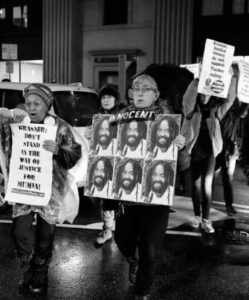
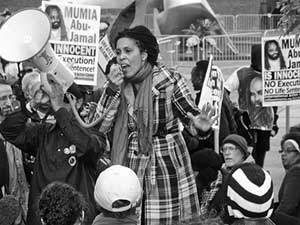
Philadelphia Judge Rules Mumia Abu-Jamal Can Reargue Case
We are pleased to begin the new year with a major development that might pave the way to freedom for former Black Panther Mumia Abu-Jamal, the award-winning journalist convicted in the 1981 murder of Philadelphia police officer Daniel Faulkner.
In late December, a Philadelphia Common Pleas Court judge ruled that Mumia can reargue his appeal in the case before the Pennsylvania Supreme Court. The decision hinges on a recent Supreme Court Decision with similar facts. Then presiding Chief Justice Ronald Castille failed to excuse himself due to his prior role as Philadelphia district attorney in Mumia’s earlier appeal. Mumia’s attorneys argued that Castille made statements related to persons accused of killing police officers that indicated he should have recused himself. His campaign speeches and letters urged capital punishment in police-killing cases.
As we’ve long reported, Mumia spent nearly three decades on death row before his sentence was thrown out over flawed jury instructions. In 2001, prosecutors agreed to a sentence of life without parole.
Judge Leon Tucker’s decision this past December was split; he denied Mumia’s claim that Castille had, “personal significant involvement” in the case while in the DA’s Office.
Guest – Professor Johanna Fernandez, is a native New Yorker. She received a PhD in History from Columbia University and a BA in Literature and American Civilization from Brown University. Professor Fernández teaches 20th Century U.S. History, the history of social movements, the political economy of American cities, and African-American history. She has previously taught at Carnegie Mellon University in Pittsburg, PA and Trinity College in Hartford, CT and is, most recently, the recipient of a Fulbright Scholars grant to the Middle East and North Africa that will take her to Jordan in spring 2011, where she will teach graduate courses in American History. She is with the Campaign to Bring Mumia Home.
—-
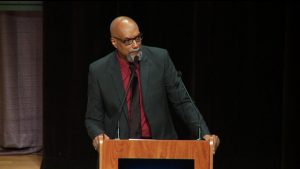

Anti-War Movement Gains Traction Amid Perpetual War
American wars undertaken in the Middle East have been raging for an historically unprecedented 17 years, ever since the attack on the World Trade Center and the Pentagon on September 11, 2001.
President George W. Bush understood that being at war president would boost his sagging popularity. First, he ordered the attack on Afghanistan on the pretext that it harbored Osama bin Laden and would not give him up.
Then, in 2003, with designs on Iraq’s oil, the United States of America unleashed an illegal war on that country. It was falsely claimed that Iraq had weapons of mass destruction and ties with Al Qaeda. The war involved the bombing of cities and was supposed to be of short duration. Americans were advised that the Iraqi people would welcome the American intervention. Their president Saddam Hussein was captured and executed. Hundreds of thousands of people were killed and hundreds of thousands we’re made refugees.
The entire Middle East was destabilized as the wars spread under the Obama administration. His secretary of state Hillary Clinton planned the aggression against Libya, where its leader Mohamar Qudaffi was captured and bayoneted to death. The country was destroyed. Clinton said at the time “we came, we saw, he died.“
The war was extended Syria, which the United States had coveted since World War II. The United States and Israel failed to kill its leader Bashar Assad but reduced much of the country to ruins and created thousands of refugees Then the United States militarily backed and supplied its Allie Saudi Arabia in its war in Yemen where 85,000 children have died of starvation.
All in all the United States made war on seven middle eastern countries simultaneously. Then, recently, fulfilling a campaign promise, President Donald Trump, the commander-in-chief, ordered the withdrawal of troops from Afghanistan and Syria. He has been opposed in this by the entire establishment, the military, the media, the intelligence agencies, and both the Republican and Democratic parties.
Guest – Ajamu Baraka, an initiator and leader of the Black Alliance for Peace, an organization which is part of the coalition. He has also just returned from a meeting of international leaders because the USA’s involvement of a possible overthrow of the government of Venezuela. Ajamu Baraka helped organize a conference in Baltimore Last month concerning USA’s 800 bases abroad particularly the new ones in Africa.
CIA Sponsored Terror, Civil Liberties, Human Rights, Supreme Court, Surveillance, Torture, Truth to Power, War Resister
Podcast: Play in new window | Download
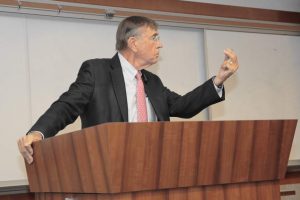
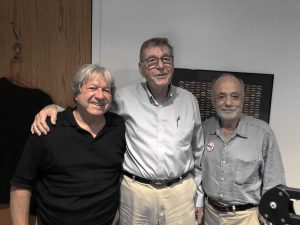
Michael E. Tigar On Challenges Lawyers Currently Face
Recently on Law And Disorder we interviewed Baher Azmy, Legal Director at the Center for Constitutional Rights, and National Lawyers Guild President Natasha Bannan. We were interested in their views of the challenges facing leftist lawyers and their movement clients face in these difficult times.
Attorney Jim Lafferty, the former head of the Los Angeles chapter of the National Lawyers Guild, who has a program on our sister station in Los Angeles, KPFK, joins me in the studio to cohost. We are going to speak for the entire hour with human rights attorney Michael Tigar.
Since the attacks on September 11, 2001, our democracy, however restricted at the time, has been even further shrunk by the growth of the national security state and the all knowing surveillance apparatus that has been set up. Moreover, the President, as the head of the executive branch of the government, has gathered unto to himself an unprecedented amount of power over the judicial and the legislative branches of the government. tigarbytes.blogspot.com/
Guest – Michael Tigar, emeritus professor of law at Duke University and at Washington College of Law. He has been a lawyer working on social change issues since the 1960s. He has argued numerous cases in United States Supreme Court and many Circuit Courts of Appeal. His books include “Law and the Rise of Capitalism”, “ Fighting Injustice ”, and the forthcoming Mythologist of State and Monopoly Power.“
———————

———————
CIA Sponsored Terror, Civil Liberties, FBI Intrusion, Gaza, Human Rights, NSA Spying, Political Prisoner, Surveillance, Targeting Muslims, Torture, Truth to Power, War Resister
Podcast: Play in new window | Download
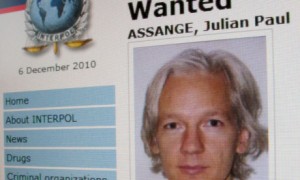
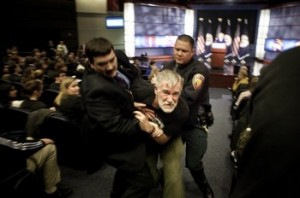
Ray McGovern: Clinton Email Wikileaks Valid
The prevailing Russia-gate narrative is that Russia colluded with Donald Trump to swing the 2016 election his way.
Special prosecutor Robert Mueller has led a nearly 2 year investigation in search of proving this. Under American law when a crime is committed prosecutors search for the culprit . In this case, critics say, the search is for the crime.
The investigation seems to be winding down with the expectation that he will soon issue his report. The major news media, Hillary Clinton, the Democratic Party, and the intelligence community have conducted a drum beat with a nearly fact free assertion that the Russians helped steal the 2016 election.
Is this story true? Is there more to it? Donald Trump after all ran his campaign on a position of easing tensions with Russia.
Is it really in our interest to perpetuate a cold war with a nuclear armed power?
Did Russia use Wikileaks and it’s editor Julian Assange to reveal secrets about the Democratic party? What were the secrets? What danger to free journalism and to truth tellers and whistle blowers does the acceptance of the allegation of Russian interference in the US elections are we facing?
Guest – Ray McGovern former CIA intelligence analyst, Ray briefed President George H. W. Bush every morning on intelligence matters, particularly with respect to Russia. He is a founder of VIPS, Veteran Intelligence Professionals for Sanity and a contributor to the blog Common Dreams.
—-
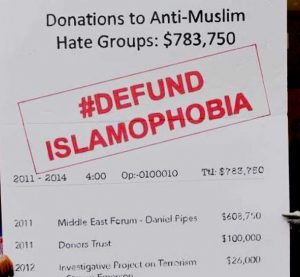
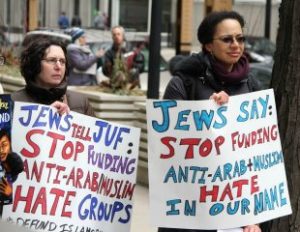
Defund Islamophobia Campaign
Fear and hatred of Arabs and Muslims existed in the United States especially after the first Gulf war, started by President George H. W. Bush a decade before the attacks on September 11, 2001.
This fear and hatred increased tremendously in the aftermath of those terrorist attacks. How could it be otherwise? It was used to stir up the American public in the ensuing devastating war against Iraq whose government was falsely linked to the attacks but wars were also fought simultaneously in six other predominately Muslim countries.
Anti-Muslim fear and hatred has been promoted in the United States by several groups and people including Pamela Geller, Daniel Pipes, and David Horowitz.
It turned out that these people and the groups through which they operate were massively funded to the tune of millions of dollars by the United Jewish Appeal in New York City and other Jewish charities in Chicago and San Francisco.
Guest – Donna Nevel is a community psychologist, educator, and co-director of PARCO. She is a long time organizer for justice and is a founding member of Jews Against Anti-Muslim Racism, Jews Say No!, and the Nakba Project.
Guest – Asaf Calderon is an Israel-American organizer and member of Jewish Voice for peace – New York City. He was born in Tel Aviv in 1991 and moved to New York in 2016. Asaf has a degree in history of the Middle East and Africa from the University of Tel Aviv, and he currently studies for his Masters of Social Work at Hunter College.
Islamophobia Report
BDSmovement.net / Endtheoccupation.org / JewishVoiceForPeace.org
CIA Sponsored Terror, Civil Liberties, Human Rights, Iraq War, Military Tribunal, Political Prisoner, Prison Industry, Prosecution of the Bush Administration, Supreme Court, Targeting Muslims, Torture, Truth to Power, War Resister
Podcast: Play in new window | Download
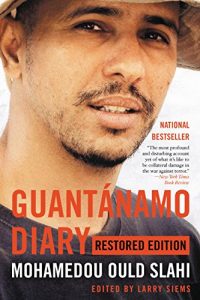
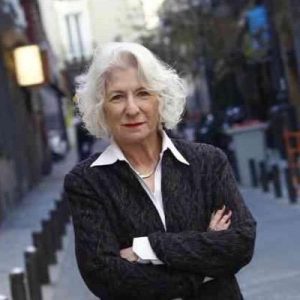
Guantanamo Diary: Mohamedou Ould Slahi
The American offshore prison camp in Guantánamo, Cuba is still operating. After the attacks on September 11, 2001, it was set up as a place where neither American or international law would apply and where prisoners could be brought, tortured, detained forever, and never charged with a crime. Ten years ago, former President Obama promised to close the offshore prison when he ran for office. It remains up and running to this day. Mohamedou Ould Slahi spent 18 years of his life there. He was an electrical engineer from Mauritania in Africa and educated in Germany. He was 32 years old when he was apprehended in his home, taken to Jordan where he was tortured, then to Afghanistan, then to Guantanamo and 16 years later at age 48, he was released. He walked out of Guantanamo Bay Prison in October 2016 without being charged with a crime and returned to his native Mauritania.
While in prison in 2005 he wrote a memoir, in English, one of his four languages. His attorney Nancy Hollander had asked him to do it and she finally got it declassified in 2012 but with heavy redactions. It was made into a book, titled Guantánamo Diary, and published in 2015 and became an international bestseller.
In it, he describes how he was tortured in ways personally approved by then Defense Secretary Donald Rumsfeld. Torture is a criminal act under both US and international law. As many know, Rumsfeld has yet to be prosecuted.
Guest – Mohamedou Ould Slahi joins hosts from his native country of Mauritania where he is a writer. He is the author of Guantanamo Diary.
Guest – Attorney Nancy Hollander has been a member of the firm Freedman Boyd Hollander Goldberg Ives & Duncan, P.A. since 1980 and a partner since 1983. Her practice is largely devoted to criminal cases, including those involving national security issues. She has also been counsel in numerous civil cases, forfeitures and administrative hearings, and has argued and won a case involving religious freedom in the United States Supreme Court. Ms. Hollander also served as a consultant to the defense in a high profile terrorism case in Ireland, has assisted counsel in other international cases and represents two prisoners at Guantanamo Bay Naval Base. Nancy is co-author of WestGroup’s Everytrial Criminal Defense Resource Book, Wharton’s Criminal Evidence, 15th Edition, and Wharton’s Criminal Procedure, 14th Edition. She has appeared on national television programs as PBS Now, Burden of Proof, the Today Show, Oprah Winfrey, CourtTV, and the MacNeill/Lehrer News Hour.
—-

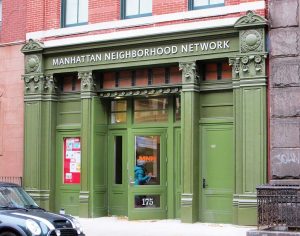
Manhattan Neighborhood Network Supreme Court Case
Is a public-access TV channel run by private nonprofit corporation subject to the First Amendment? The Supreme Court will consider that question in a case involving the Manhattan Neighborhood Network or MNN. In 1991 MNN was designated to operate as a public-access channel in New York City. The Manhattan Borough President has no control over MNN but does pick two of its thirteen board members.
In 2012 Jesus Melendez, an occasional contributor to MNN, was suspended for trying to attend a board meeting. His associate Deedee Halleck then videoed him outside talking about the situation. MNN banned the video from airing. Melendez and Deedee brought a First Amendment claim against MNN asking if the network is a state actor for purposes of their First Amendment rights. The district court said no, noting that, while it was a close call, other circuits had concluded that privately run public-access networks were not state actors.
The Supreme Court hasn’t directly weighed in on this question although Justice Anthony Kennedy, in a 1996 concurrence in a case dealing with laws regulating content on public-access channels, wrote they should be considered state actors who run public fora and thus be subject to the First Amendment. Justice Clarence Thomas disagreed in his concurrence, writing that “franchising authorities require cable operators to create public access channels, but nothing in the record suggests that local franchising authorities take any formal easement or other property interest in those channels that would permit the government to designate that property as a public forum.”
Defenders of MNN claim, that while it’s possible that some public-access channels could be rightly called state actors, the Court should take the case to clarify the state-actor test and to review the Second Circuit’s unnecessarily broad opinion.
Guest – Deedee Halleck one of the plaintiffs in this case and among the top media activists. She’s co-founder of Paper Tiger Television and also the Deep Dish Satellite Network, the first grass roots community television network. She is Professor Emerita in the Department of Communication at the University of California at San Diego.
Guest – Attorney Paul W. Hughes, a partner in the law firm Mayer Brown’s appellate and Supreme Court practice. Paul has handled more than 200 appellate matters, more than 125 of which were in the U.S. Supreme Court. In 2017The American Lawyer named Hughes “Litigator of the Week” in connection with his immigration work.






















